18 November 2024
![]() 6 mins Read
6 mins Read
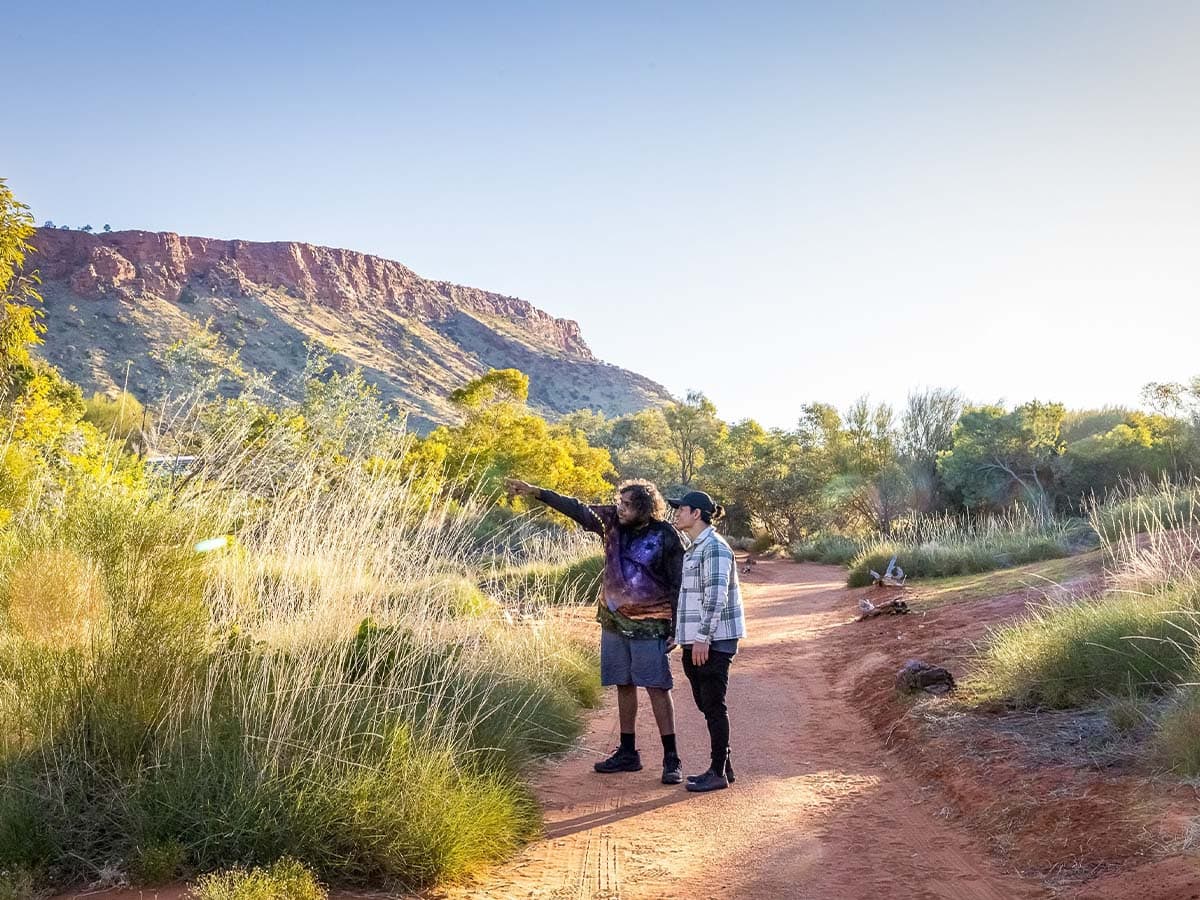
After a rainy week in April, Alice Springs/Mparntwe is ripe like a desert fruit. The air is sweet, the creeks are swollen, and the landscapes are flush with vivid green foliage. Come nightfall, the annual Parrtjima light festival competes with the glittering outback starscapes, casting brilliant images against the shadowy backdrop of the MacDonnell Ranges. Small children chase projections of Aboriginal art across the ground or stand mesmerised in front of a giant illuminated puppet roving about the festival. The experience is nothing short of magical. But it’s a far cry from the portrayal of Alice Springs that has pervaded over the last few years. We caught up with some locals to go behind the headlines and get a glimpse into a totally different side of Alice Springs.
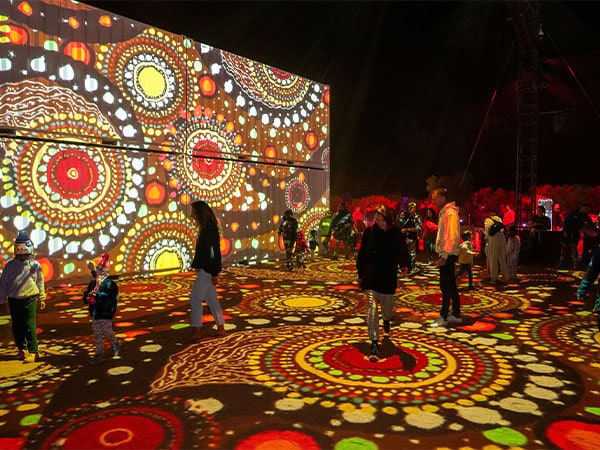
Parrtjima lights up the night, combining traditional art forms with modern technology.
The Red Centre is a once-in-a-lifetime destination that’s a fixture on bucket lists around the world. But given the reports of unrest and a crime crisis, should you reconsider plans to travel to Australia’s unofficial outback capital? The answer is a definitive no, according to John Stafford of Alice Springs Expeditions, “people who have booked tours have asked me if they should defer, and I’ve said to them, absolutely not. I’ve convinced them to come, and without exception, everyone in the last month has said that Alice Springs is nothing like what’s been portrayed”.
John points out that the issues highlighted in the media also apply to many other towns, suburbs and regions in Australia, but Alice Springs receives a disproportionate amount of attention.
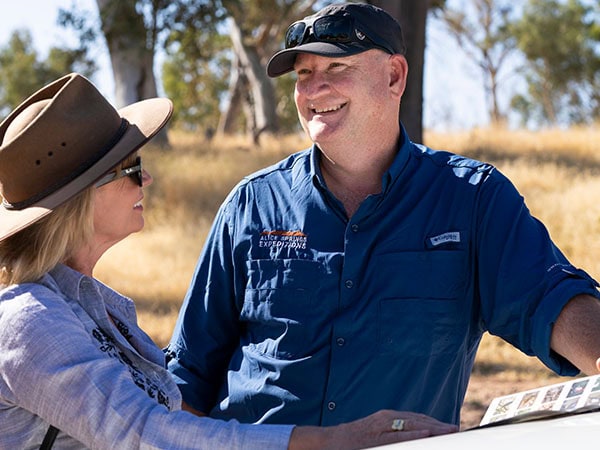
John Stafford runs Alice Springs Expeditions. (Image: Tourism Australia/Shaana McNaught)
“Don’t get me wrong, [the incident at Todd Tavern] isn’t great. I’m not trying to sugarcoat it. But at the same time, is it reflective of what happens here day to day? No, it isn’t. It’s sad to think that people might potentially miss out on a really awesome experience [coming here] based on what I consider to be unfair press.”
As Alice Spring heads into winter, temperatures cool and the night sky becomes increasingly vivid. The town is abuzz with a roster of outback festivals, like the quaint and quirky Alice Springs Beanie Festival – a four-day celebration of hand-crafted headwear from the town and the remote communities that surround it. “The proof is in the pudding,” says John, “when visitors come here, they’ve expected one thing and they see something very, very different”.
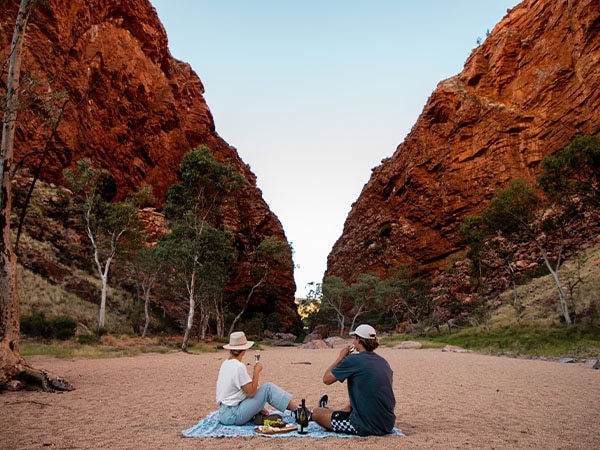
Take your time to absorb the vivid colours of Simpson’s Gap. (Image: Tourism NT/The Salty Travellers)
Anna Dakin moved to Alice Springs from London six years ago. Now, she spends her days taking visitors out for painting excursions in the countryside with her tour company, Art Tours of Australia.
“[The most prevalent change] I’ve noticed in the town is the drop in visitors and a sense of frustration shared by myself and other tour operators,” she says.

Mountain biking through the beautiful MacDonnell Ranges. (Image: Tourism NT/Travis Deane)
“This town is so gorgeous, it’s outrageous … there are all of these little magical moments that happen here that are a thousand times more powerful than the brief moments of unrest focused on by the media,” she says. Anna recalls her most recent moment of magic, a leisurely Friday evening spent listening to a talk by a bush food expert before heading to a new cocktail bar, Crimson Chat, for a bush tucker-inspired cocktail and strolling home beneath a star-lit sky. “I could never walk from my home in London … the level of safety I [feel] walking around Alice Springs is really incomparable to what I felt in a big city,” she says. “It’s easy to forget that everywhere we visit has some kind of danger. Alice Springs is no different, but the danger is actually relatively low out here.
On Anna’s last art tour, the group fell into a discussion about what makes the landscape feel so profound and magical. “It all leads back to the culture that has shaped this environment. There’s a level of frustration among people who come [on tour] with me that they don’t know more about the incredible cultures of Central Australia [such as the Arrernte and the Aṉangu cultures]… It’s a shame that when people think of Alice Springs they think of danger, when actually what is here, is vibrance and inspiration and some of the most ancient and inspiring landscapes in the world.”
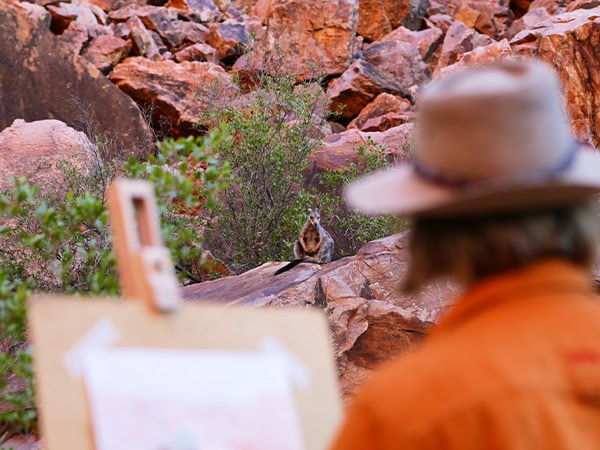
Anna Dakin runs Australian Art Tours, taking visitors out to paint some of the region’s beautiful landscapes.
Local frustration surrounding the media’s fixation on crime is deepened by its failure to discuss the more complex and nuanced reasons for its existence. “[The situation] is the outcome of decades of systemic underinvestment, neglect and punitive measures and controls, many imposed and still remaining from the NT Intervention”, wrote Australia’s Aboriginal and Torres Strait Islander Social Justice Commissioner June Oscar in a report calling for community-led solutions in Alice Springs.
Local Arrernte Elder Paul Ah Chee shares the sentiment of frustration with the media’s hyperfocus on crime in Alice Springs. “I do think that it’s somewhat blown out of all proportion, and manifests in people outside of Alice Springs believing that the town is completely chaotic and lawless,” he says. Paul also cites poverty and The Gap between Aboriginal and non Aboriginal people as a contributing factor to the incidents of unrest that are often left out of media discourse on Alice Springs: “The gap is probably increasing rather than decreasing. Certain elements of closing the gap have been addressed and we can see some incremental positive change, but on the whole it’s a challenge.”

Alice Springs Desert Park is an oasis for wildlife. (Image: Tourism NT/Helen Orr)
Although systemic issues don’t have an overnight solution, it underscores the importance of visiting, learning and fostering cross-cultural understandings. “It’s a beautiful little town,” says Paul. “It’s got natural beauty and some great tourism products that people can go and visit. The people here on the whole are friendly and it’s a wonderful place to visit…There’s lots of festivals, there’s lots of celebration. It’s a very creative town.”
I am saddened by the report on Alice Springs which I have visited for more that 30 yesrs, the Red Centre still being seen as a mess. Of course there is much more to the Alice than that. Having said that, neglect by the authorities still seems to be an issue. I find this very strange. Will there ever be a true reconciliation?
I have 2 weeks booked in Alice Springs shortly. I’m really looking forward to it. I am traveling around Australia at the moment.
Thank you for the positive comments for a change it is a magical place. Our media has a lot to answer for probably by people who have never been here. Well done